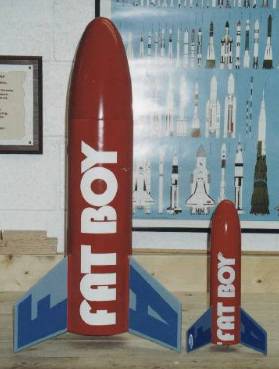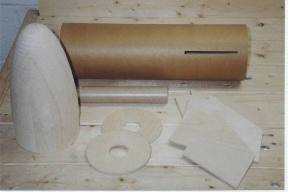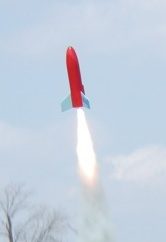Scratch Fat Man Do Original Design / Scratch Built
Scratch - Fat Man Do {Scratch}
Contributed by Dave Rose
| Manufacturer: | Scratch |
 (Contributed
- by Dave Rose - 10/20/01)
(Contributed
- by Dave Rose - 10/20/01) For reasons unknown, over the last two or three years I have grown very infatuated with short, fat rockets. Having built many three and four inch diameter rockets that fall into my favorite category, I'm always looking for another design that fits the "stubby" look. One of the most popular model rocket kits available is the Estes Fat Boy. The first time I saw this rocket, I knew that it would be the perfect design for me to upscale. The most difficult part of enlarging this rocket is the unavailability of a large, rounded nosecone to match the original.
I decided that I would build one out of solid balsa wood and turn it on my
lathe. Due to the fact that my lathe would only accept a piece of wood up to
six inches in diameter, it only made sense to build it based on a 5 1/2"
airframe. Using Tim Van Milligan's excellent RockSim 4.0 design program, what
resulted was a 2.13X upscale of the original Estes kit. Overall length was
approximately 28 inches, with a total weight of just under 4 pounds without the
motor. Fins were constructed from 1/4" aircraft plywood and were mounted
through the airframe to the 38mm motor mount. Twin centering rings were custom
 cut from the same
plywood with T-nuts installed in the aft ring for positive motor retention. To
maintain stability, the nosecone was partially hollowed and 1 pound of weight
was added before capping with a plywood plug, epoxied into place. Recovery is
motor based using a Sky-Angle parachute with a heat-proof Nomex®
protector and fifteen feet of 9/16" tubular nylon for the shock cord.
cut from the same
plywood with T-nuts installed in the aft ring for positive motor retention. To
maintain stability, the nosecone was partially hollowed and 1 pound of weight
was added before capping with a plywood plug, epoxied into place. Recovery is
motor based using a Sky-Angle parachute with a heat-proof Nomex®
protector and fifteen feet of 9/16" tubular nylon for the shock cord.
 Finishing was done with Krylon enamel and the vinyl
graphics were made by Randy Brust, a gentleman I met through the RMR newsgroup.
The nylon shock cord replaced the original 5/8" elastic shock cord after
the first flight resulted in the nosecone separating and free-falling from
about 1500 feet. (with minimal damage) It has flown successfully each time
since then, every time on an I161W reload, to an altitude of about 2000 feet.
The pictures on this page show the Fat Man Do in various stages of
construction, posed along side the original, and with me standing in line
waiting to launch at LDRS 19 in Orangeburg, SC, and launched at our April 2001
Dragon's Fire launch in Charleroi, PA on an I161 reload.
Finishing was done with Krylon enamel and the vinyl
graphics were made by Randy Brust, a gentleman I met through the RMR newsgroup.
The nylon shock cord replaced the original 5/8" elastic shock cord after
the first flight resulted in the nosecone separating and free-falling from
about 1500 feet. (with minimal damage) It has flown successfully each time
since then, every time on an I161W reload, to an altitude of about 2000 feet.
The pictures on this page show the Fat Man Do in various stages of
construction, posed along side the original, and with me standing in line
waiting to launch at LDRS 19 in Orangeburg, SC, and launched at our April 2001
Dragon's Fire launch in Charleroi, PA on an I161 reload.
 |
 |